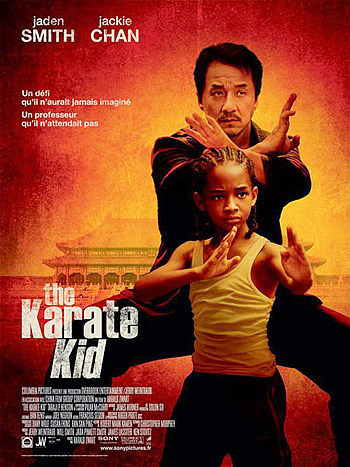|
|

|
|
The poster of The Karate Kid (LOYALKNG.COM) |
When The Karate Kid, a coming-of-age tale about a boy who studies martial arts to overcome his enemies and his fears, was released in the United States in 1984, it was an instant hit. It inspired audiences to take up karate and made "wax on, wax off" a lasting catchphrase. The film and its sequels made actors Ralph Macchio and Pat Morita into stars and defined their careers. What could filmmakers possibly do to justify a remake?
Move it to China.
The new Karate Kid, directed by Harald Zwart, closely follows the storyline from the original: New kid in town runs afoul of some bullies, finds an unlikely mentor, masters some martial arts moves, and finally faces down his tormentors at a tournament. But the new film, a joint production between Columbia Pictures and China Film Group, raises the stakes – the protagonist finds himself not only in a new neighborhood, but an entirely different culture. Jaden Smith (son of Will) plays 12-year-old Dre Parker, who reluctantly moves with his mother from Detroit to Beijing. On his first day he meets Mei Ying (Han Wenwen), a young girl whose friend Cheng (Wang Zhenwei) welcomes Dre with a kungfu beating.
Dre turns to maintenance man Mr. Han, played by Jackie Chan in a more serious and welcome change of role for him. When Mr. Han takes Dre to confront Cheng and his ruthless kungfu coach, they challenge Dre to a showdown at an upcoming tournament. Now it's up to Mr. Han to prepare him.
Moviegoers in Beijing will enjoy seeing the CCTV Tower, Bird's Nest, Forbidden City and other landmarks onscreen, although they might question how Dre can run from Jingshan Park in downtown to Wudaokou in northwestern Beijing in 20 minutes. The newly arrived Parkers are baffled by everyday situations that should be familiar to any Beijing expat – as when Taraji P. Henson (Hustle & Flow, The Curious Case of Benjamin Button), a strong addition to the cast as Dre's mother, wonders how her electricity card works. It's easy to sympathize with Dre's feelings of alienation, even when they explode in a full-blown temper tantrum on the street with his mother.
Western reviewers have alternately criticized The Karate Kid for being too flattering or too insulting in its depiction of China. Some say it serves as a promotion tool, showcasing the Great Wall and other breathtaking landscapes. Others say Beijing comes across as too crowded and dirty. Overall, however, the movie gives a balanced if somewhat shallow view, displaying both the good and bad. It also works to dispel a few myths and stereotypes – Dre's mom points out that, contrary to popular belief, fortune cookies are not a Chinese creation.
Smith has inherited his father's charm and ably plays the physically demanding role, but he doesn't quite live up to his predecessor Macchio. In the original film, the main character is several years older than Dre, well into high school. The story somehow becomes less compelling when the characters are all preteens. The age difference also makes for a less credible love story between Dre and Mei Ying. The sanitized, slightly shorter version of the film in Chinese movie theaters is missing a discomfiting kiss between Dre and Mei Ying, as well as a scene from the tournament in which Cheng's coach tells another student to purposely injure Dre so that he can no longer compete. Using younger actors makes the fight scenes seem more violent. Perhaps the Smith family – Jaden's parents both served as producers – should have waited a few more years to make this film.
At 140 minutes, The Karate Kid also runs too long. The film takes too long to get to the most satisfying part, the tournament, where the kids expertly deploy flips, kicks and strikes. Some of the more advanced moves, however, stretch the boundaries of believability.
Despite its flaws, The Karate Kid is surprisingly fun. With over $200 million in worldwide ticket sales – several times its production budget – the movie is already prompting speculation over a possible sequel. Jaden Smith may have turned this remake into a whole new franchise. |
